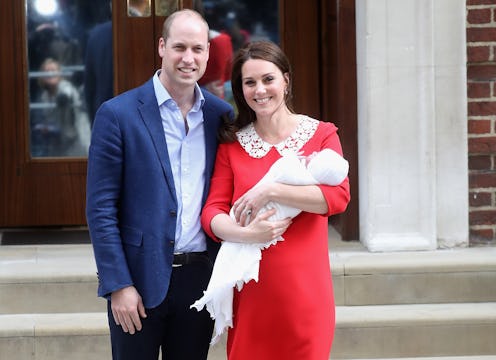
As you are likely well aware, the Duchess of Cambridge gave birth to her third child earlier this week, and now I'm even more jealous of William and Kate's picture-perfect family — especially after seeing Duchess's flawless post-birth appearance. With the royal family being worth billions of dollars, per CNBC, it's unlikely that anyone was concerned about the costs of Kate's labor and delivery. But as an analysis by The Economist notes, it's literally cheaper to deliver a royal baby than it is to have a child (of any level of royalty) in the U.S. According to The Economist, it can cost parents $10,808, on average, to have a baby in the U.S., while a deluxe room in the Lindo Wing at St. Mary's Hospital in London cost $8,900 in 2015. Both estimates are for vaginal births with no complications, but as WebMD notes, a cesarean section ran around $15,800 in 2008, and if a baby ends up in the NICU, you could face costs as high as $200,000, according to the nonprofit organization March of Dimes.
The Lindo Wing at St. Mary's is a private area of the hospital often chosen by celebrities, royals, and wealthy people — had the Duchess operated for "regular" maternity care, her out-of-pocket costs would've been covered by Britain's National Health Service. If you have insurance in the U.S., you likely won't be on the hook for the entire hospital bill, but you'll still be paying out-of-pocket fees around $3,000 on average, according to the report.
If you're wondering why people are pushing for health care reform, this sums it up. The realization that an ordinary person can pay more money than literal royalty is pretty shocking. Though I haven't experienced childbirth, various hospital visits have left me with thousands of dollars in co-payments, and I have good health insurance. Trying to pay off bills and talk to hospitals, and insurance companies can be hard for me to navigate, and I'm a healthy person with a lot of free time. A woman who's physically and emotionally exhausted and responsible for a newborn baby is going to be under even more stress. A 2013 analysis from Childbirth Connection, an organization that focuses on maternity care, points out that even healthy pregnancies and births with no complications can be unnecessarily expensive.
Most childbearing women are healthy, have healthy fetuses, and have reason to expect an uncomplicated birth, yet routine maternity care is technology-intensive and expensive: combined maternal and newborn care is the most common and costly type of hospital care for all payers, private payers, and Medicaid.
And when parents have no way to pay the hefty bills they receive, they have to get creative. Crowdfunding website GoFundMe has hundreds of campaigns related to labor and delivery costs. Another report by Childbirth Connection — this one published in 2010 — outlined all of the things the organization hoped to see change in maternity care by 2020. Unfortunately, it feels like we're moving backwards, especially with President Donald Trump's determination to repeal the Affordable Care Act.
In a Splinter News article published earlier this month, writer Molly Osberg investigated the stress and financial burden that uninsured pregnant women face. According to Osberg's reporting, uninsured women of color are at an even higher risk for undue stress during pregnancy. Many people are calling for the U.S. maternity healthcare system to be overhauled. For women in the U.S. who aren't wealthy, delivering a child can be cost-prohibitive and even cause unexpected debt — and it's even worse for uninsured women. We're still ooh-ing and aah-ing over the newest royal and anxiously awaiting their name reveal, but their arrival does give us a reason to think about the way childbirth is handled in the U.S.